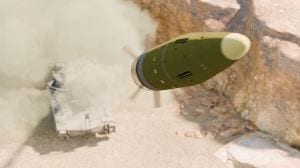CD to discuss tension in the Indian subcontinent
GENEVA, JUNE 2: Over 45 countries today discussed India and Pakistan's nuclear blasts and their many dimensions at the United Nations Confer...

GENEVA, JUNE 2: Over 45 countries today discussed India and Pakistan’s nuclear blasts and their many dimensions at the United Nations Conference on Disarmament (CD) on the eve of a meeting between the five declared nuclear weapons supposedly aimed at easing tensions and restoring peace in what Western nations believe is limited to the South Asian region.
Separately, a UN spokeswoman announced that foreign ministers from the five permanent members of the UN Security Council, Russia, United States, France, China and the United Kingdom, the five declared and accepted members of the nuclear club, will meet in Geneva on Thursday to discuss the South Asian nuclear crisis.
At the CD, a majority of countries that spoke including the nuclear five, members of the European Union, Japan, South Africa and Latin American nations demanded that Islamabad and New Delhi cease testing immediately and join international nuclear disarmament treaties as a means to easing tension in South Asia.
Nobody raised the Kashmir issueat the forum. Pakistan which is seeking to anchor that at the heart of the current debate has repeatedly stated that the Kashmir question is the underlying cause for tension between India and Pakistan which now includes the nuclear question and asymmetry in conventional weapons.
Pakistan’s envoy Munir Akram told reporters he was seeking bilateral meetings with “friendly countries” among the P5 meeting in Geneva on Thursday interpreted to mean China, the United States and possibly Britain. Diplomats say Pakistan is seeking a mention of the Kashmir problem in that foreign minister’s declaration. India told today’s meeting of the CD that New Delhi’s security concerns stretched beyond what the forum was examining and willing to comment upon during the past few weeks.
“Artificial de-limitation and selective and compartmentalised approaches which seek to limit these issues to the so-called South Asia’ are defective. I have already pointed out that India’s security concerns go beyond South Asia. Our concernsin this regard should not be ignored,” said Savitri Kunadi, India’s Ambassador to the UN.
She told the body there was an accumulation of nuclear weapons and missiles in India’s neighbourhood and unlike Pakistan whose approach had been Indo-centric’ India’s “security perspectives were global in range and scope” and that India wanted nuclear non-proliferation and disarmament issues to be discussed ”in a global framework and in a comprehensive and non-discriminatory manner.”
Kunadi took the floor at the end of the day to place on record the Indian Prime Minister’s statement to Parliament last week where India self-imposed a moratorium on further testing and indicated it was willing to move towards a de-jure formalisation of this declaration.
Thursday’s meeting of the P5 is slated to debate the nuclear situation in South Asia, the proliferation of nuclear weapons and ways to ease tensions in the region, reports reaching Geneva from Beijing quoting Chinese foreign ministry spokesman Zhu Bangzao said.China which is acting coordinator of the P5 will chair the meeting. A spokesman for the United States State Department has said Washington will not use the meeting to seek support for sanctions against India and Pakistan. “The current situation in South Asia has been triggered off by India India is solely responsible for it,” Chinese envoy Li Change told the CD today as it heard Australia and New Zealand seeking support for a joint statement condemning nuclear testing and calling on India and Pakistan to sign global arms control pacts. Li Change told reporters “the Kashmir issue was central to the crisis in South Asia” but declined to comment if it would figure in the ministerial declaration being readied for Thursday.
Several diplomats told this newspaper they didn’t think Kashmir was critical to the current crisis between the two countries.
“Kashmir is one of many parts of the problem…China is another as has been stated by the Indian government,” France’s envoy Joelle Bourgois said.
“We callon India and Pakistan to abandon immediately the course of action they are pursuing and settle their security concerns and differences through political engagement,” said a joint statement from Australia and New Zealand endorsed in varying degrees by many CD members.
Australian ambassador John Campbell told delegates, “Pakistan’s decision to ignore the inevitable implications of its actions for global and regional security reveals that its professed desire to end the nuclear weapons era, like that of the government of India, is no more than a deception.”
The statement called on India and Pakistan to join the “international consensus” which bans nuclear testing and other explosive devices and urged both countries to sign the 1996 Comprehensive Test Ban Treaty (CTBT) and the 1970 Nuclear Non-Proliferation Treaty (NPT).
Both countries are expected to block any consensus on the text should there be moves to seek one. “The basic flaw with this text is that it ignores calls for negotiations on nucleardisarmament,” South Africa’s envoy Jacob Salebi told The Indian Express. Earlier, he told the CD developments between India and Pakistan have made it “even more imperative that the Conference on Disarmament in Geneva should now actively and with determination address the issue of nuclear disarmament.” Salebi said South Africa wanted the immediate establishment of an ad hoc committee in the CD to address this issue.
The CD’s failure to set up an ad hoc committee to negotiate total and complete nuclear disarmament within a timetable was one of the reason’s India walked away from the CTBT. Munir Akram rejected the text as unfairly punishing his country for merely responding to India’s tests. ”We are not culpable,” Akram told reporters.”The world can’t treat Pakistan and India in the same way. It is India who has instigated the crisis.”



- 01
- 02
- 03
- 04
- 05



























